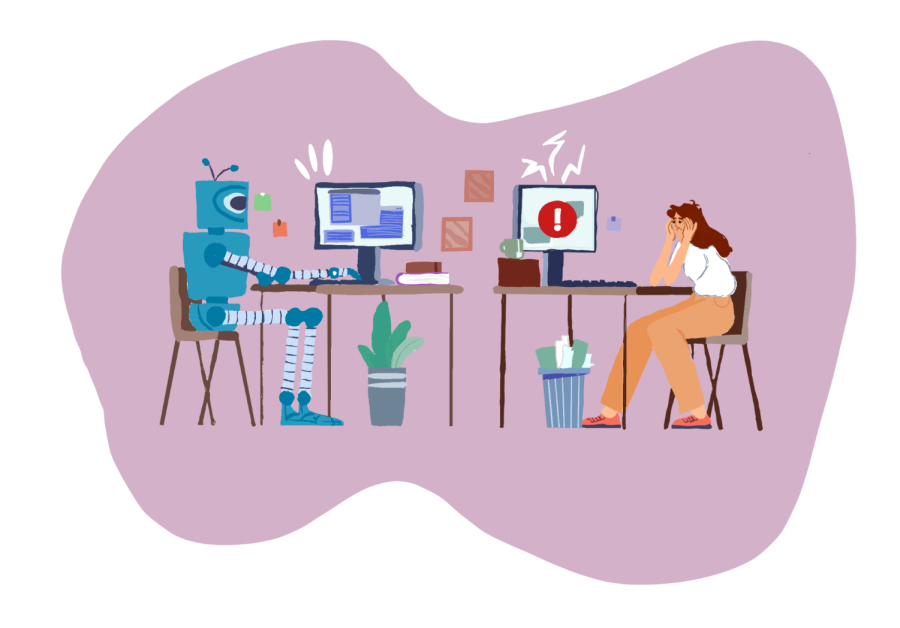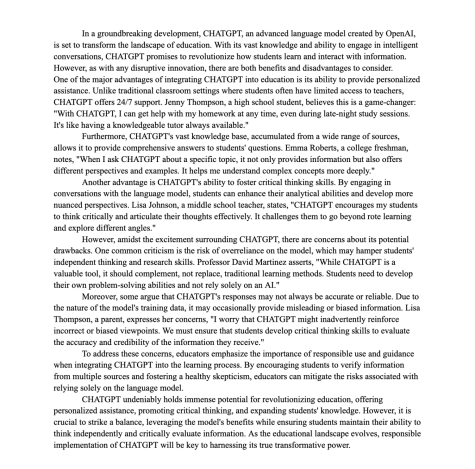The future of education is in the hands of AI
Teachers and students around De Soto talk about the usage of AI, specifically ChatGPT.
AI doing their work in seconds, as an actual human struggles with coming up with ideas for assignments.
In a groundbreaking development, ChatGPT, an advanced language model created by OpenAI, is set to transform the landscape of education. With its vast knowledge and ability to engage in intelligent conversations, ChatGPT promises to revolutionize how students learn and interact with information. However, as with any disruptive innovation, there are both benefits and disadvantages to consider.
This first paragraph may seem like something I might write, as I have experience in journalism and I am additionally enrolled in advanced English classes. However, that is not the case, as I had ChatGPT write the entire first paragraph. Not only did AI write the first paragraph, but also an entire column filled with essential facts and interviews.
With the rise of AI, there are many factors that need to be taken into account in the student setting. In the past few months, I have been on social media apps like Twitter and TikTok where users are talking about using ChatGPT to write an entire essay for them.
Therefore, AI can be beneficial if used to establish a base for research, but students can take advantage of AI, making it do the entire assignment instead.
Junior, Peri Schmidt has seen ChatGPT used around De Soto.
“ChatGPT is like a double-edged sword. One side of it is that students will use it in a very harmful way, [but] students [can] use it in a very resourceful way, like learning new things and overall applying it to certain learning situations,” Schmidt said.
Schmidt explained how she has used ChatGPT or other AI’s in basic manners to expand her learning.
“I have used it to learn new skills in school, but I have not used it in a way that would be considered academic dishonesty.”
Teachers at De Soto have also noticed the advancement of AI utilization in the classroom. ChatGPT has affected the History and English departments the most.
In a positive light, Mr. Javier Vierya explains how he hopes his students will use ChatGPT.
“It’s an awesome tool for everybody … but it’s also problematic on how it’s used sometimes. It does a good job at simplifying things. [In history] it’s a good tool to use if a student needs to relearn information in a simple way,” Vierya said.
On another note, Mr. Philip Hamilton, AP English teacher, has explained the consequences and inaccuracies that AI can bring to an assignment. “I utilized AI to try to write an APLAC paper for the Persuasive Research Essay … it had a few issues that I think students would not realize, typically following the assignment guidelines and overall [rubric].”
Mr. Hamilton considers AI an interesting research tool for the future.
“One of my former students used AI as a peer editor, asking for flaws and feedback.”
Overall, ChatGPT is going to change the learning environment, specifically as the year wraps up, as well as next year with more AI development and learning usage of the tool. AI is going to be a big game-changer for assignments. In comparison to ChatGPT, there are verified learning sources, such as Khan Academy, that will use AI to help students learn problems in steps. Ultimately, education is going to be impacted by AI resources.
ChatGPT writes the same newspaper column, filled with information they found of the positives and negatives of using AI in the future.

Meet Sara Stephenson, Podcast/Social Media Editor. This is Sara's senior year as well as her second year on the staff team. Sara's favorite types of stories...



